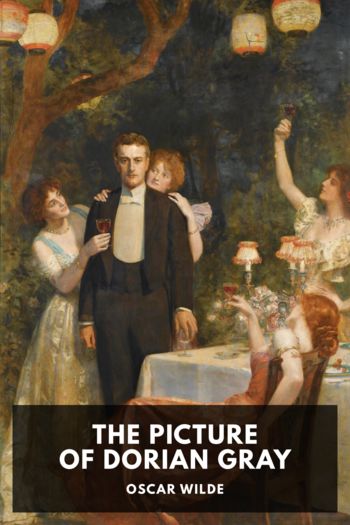The Picture of Dorian Gray - Oscar Wilde (universal ebook reader txt) 📗

- Author: Oscar Wilde
Book online «The Picture of Dorian Gray - Oscar Wilde (universal ebook reader txt) 📗». Author Oscar Wilde
Such, at any rate, was Dorian Gray’s opinion. He used to wonder at the shallow psychology of those who conceive the ego in man as a thing simple, permanent, reliable, and of one essence. To him, man was a being with myriad lives and myriad sensations, a complex multiform creature that bore within itself strange legacies of thought and passion, and whose very flesh was tainted with the monstrous maladies of the dead. He loved to stroll through the gaunt cold picture-gallery of his country house and look at the various portraits of those whose blood flowed in his veins. Here was Philip Herbert, described by Francis Osborne, in his Memoires on the Reigns of Queen Elizabeth and King James, as one who was “caressed by the Court for his handsome face, which kept him not long company.” Was it young Herbert’s life that he sometimes led? Had some strange poisonous germ crept from body to body till it had reached his own? Was it some dim sense of that ruined grace that had made him so suddenly, and almost without cause, give utterance, in Basil Hallward’s studio, to the mad prayer that had so changed his life? Here, in gold-embroidered red doublet, jewelled surcoat, and gilt-edged ruff and wristbands, stood Sir Anthony Sherard, with his silver-and-black armour piled at his feet. What had this man’s legacy been? Had the lover of Giovanna of Naples bequeathed him some inheritance of sin and shame? Were his own actions merely the dreams that the dead man had not dared to realize? Here, from the fading canvas, smiled Lady Elizabeth Devereux, in her gauze hood, pearl stomacher, and pink slashed sleeves. A flower was in her right hand, and her left clasped an enamelled collar of white and damask roses. On a table by her side lay a mandolin and an apple. There were large green rosettes upon her little pointed shoes. He knew her life, and the strange stories that were told about her lovers. Had he something of her temperament in him? These oval, heavy-lidded eyes seemed to look curiously at him. What of George Willoughby, with his powdered hair and fantastic patches? How evil he looked! The face was saturnine and swarthy, and the sensual lips seemed to be twisted with disdain. Delicate lace ruffles fell over the lean yellow hands that were so overladen with rings. He had been a macaroni of the eighteenth century, and the friend, in his youth, of Lord Ferrars. What of the second Lord Beckenham, the companion of the Prince Regent in his wildest days, and one of the witnesses at the secret marriage with Mrs. Fitzherbert? How proud and handsome he was, with his chestnut curls and insolent pose! What passions had he bequeathed? The world had looked upon him as infamous. He had led the orgies at Carlton House. The star of the Garter glittered upon his breast. Beside him hung the portrait of his wife, a pallid, thin-lipped woman in black. Her blood, also, stirred within him. How curious it all seemed! And his mother with her Lady Hamilton face and her moist, wine-dashed lips—he knew what he had got from her. He had got from her his beauty, and his passion for the beauty of others. She laughed at him in her loose Bacchante dress. There were vine leaves in her hair. The purple spilled from the cup she was holding. The carnations of the painting had withered, but the eyes were still wonderful in their depth and brilliancy of colour. They seemed to follow him wherever he went.
Yet one had ancestors in literature as well as in one’s own race, nearer perhaps in type and temperament, many of them, and certainly with an influence of which one was more absolutely conscious. There were times when it appeared to Dorian Gray that the whole of history was merely the record of his own life, not as he had lived it in act and circumstance, but as his imagination had created it for him, as it had been in his brain and in his passions. He felt that he had known them all, those strange terrible figures that had passed across the stage of the world and made sin so marvellous and evil so full of subtlety. It seemed to him that in some mysterious way their lives had been his own.
The hero of the wonderful novel that had so influenced his life had himself known this curious fancy. In the seventh chapter he tells how, crowned with laurel, lest lightning might strike him, he had sat, as Tiberius, in a garden at Capri, reading the shameful books of Elephantis, while dwarfs and peacocks strutted round him and the flute-player mocked the swinger of the censer; and, as Caligula, had caroused with the green-shirted jockeys in their stables and supped in an ivory manger with a jewel-frontleted horse; and, as Domitian, had wandered through a corridor lined with marble mirrors, looking round with haggard eyes for the reflection of the dagger that was to end his days, and sick with that ennui, that terrible tædium vitae, that comes on those to whom life denies nothing; and had peered through a clear emerald at the red shambles of the circus and then, in a litter of pearl and purple drawn by silver-shod mules, been carried through the Street of





Comments (0)